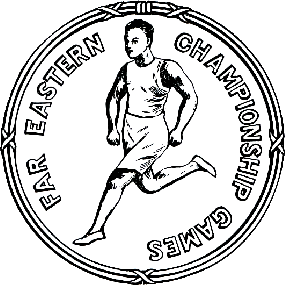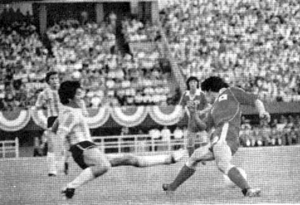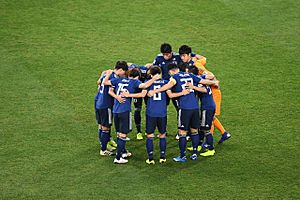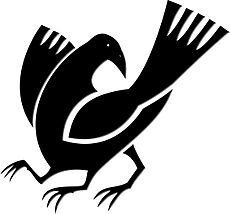Japan national football team facts for kids
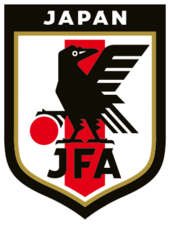 |
||||||||||||||||||||||||||||||||||||||||||||||||||||||||||||||||||||||||||
| Nickname(s) | サムライ・ブルー (Samurai Blue) Since 19 October 2009 |
|||||||||||||||||||||||||||||||||||||||||||||||||||||||||||||||||||||||||
|---|---|---|---|---|---|---|---|---|---|---|---|---|---|---|---|---|---|---|---|---|---|---|---|---|---|---|---|---|---|---|---|---|---|---|---|---|---|---|---|---|---|---|---|---|---|---|---|---|---|---|---|---|---|---|---|---|---|---|---|---|---|---|---|---|---|---|---|---|---|---|---|---|---|---|
| Association | Japan Football Association (JFA) | |||||||||||||||||||||||||||||||||||||||||||||||||||||||||||||||||||||||||
| Confederation | AFC (Asia) | |||||||||||||||||||||||||||||||||||||||||||||||||||||||||||||||||||||||||
| Sub-confederation | EAFF (East Asia) | |||||||||||||||||||||||||||||||||||||||||||||||||||||||||||||||||||||||||
| Head coach | Hajime Moriyasu | |||||||||||||||||||||||||||||||||||||||||||||||||||||||||||||||||||||||||
| Captain | Wataru Endō | |||||||||||||||||||||||||||||||||||||||||||||||||||||||||||||||||||||||||
| Most caps | Yasuhito Endō (152) | |||||||||||||||||||||||||||||||||||||||||||||||||||||||||||||||||||||||||
| Top scorer | Kunishige Kamamoto (75) | |||||||||||||||||||||||||||||||||||||||||||||||||||||||||||||||||||||||||
| Home stadium | Various | |||||||||||||||||||||||||||||||||||||||||||||||||||||||||||||||||||||||||
| FIFA code | JPN | |||||||||||||||||||||||||||||||||||||||||||||||||||||||||||||||||||||||||
|
||||||||||||||||||||||||||||||||||||||||||||||||||||||||||||||||||||||||||
| FIFA ranking | ||||||||||||||||||||||||||||||||||||||||||||||||||||||||||||||||||||||||||
| Current | 27 |
|||||||||||||||||||||||||||||||||||||||||||||||||||||||||||||||||||||||||
| Highest | 9 (February–March 1998) | |||||||||||||||||||||||||||||||||||||||||||||||||||||||||||||||||||||||||
| Lowest | 66 (December 1992) | |||||||||||||||||||||||||||||||||||||||||||||||||||||||||||||||||||||||||
| Elo ranking | ||||||||||||||||||||||||||||||||||||||||||||||||||||||||||||||||||||||||||
| Current | 23 |
|||||||||||||||||||||||||||||||||||||||||||||||||||||||||||||||||||||||||
| Highest | 8 (August 2001, March 2002) | |||||||||||||||||||||||||||||||||||||||||||||||||||||||||||||||||||||||||
| Lowest | 123 (September 1962) | |||||||||||||||||||||||||||||||||||||||||||||||||||||||||||||||||||||||||
| First international | ||||||||||||||||||||||||||||||||||||||||||||||||||||||||||||||||||||||||||
(Tokyo, Japan; 9 May 1917) |
||||||||||||||||||||||||||||||||||||||||||||||||||||||||||||||||||||||||||
| Biggest win | ||||||||||||||||||||||||||||||||||||||||||||||||||||||||||||||||||||||||||
(Tokyo; 27 September 1967) |
||||||||||||||||||||||||||||||||||||||||||||||||||||||||||||||||||||||||||
| Biggest defeat | ||||||||||||||||||||||||||||||||||||||||||||||||||||||||||||||||||||||||||
(Tokyo; 10 May 1917) |
||||||||||||||||||||||||||||||||||||||||||||||||||||||||||||||||||||||||||
| World Cup | ||||||||||||||||||||||||||||||||||||||||||||||||||||||||||||||||||||||||||
| Appearances | 8 (first in 1998) | |||||||||||||||||||||||||||||||||||||||||||||||||||||||||||||||||||||||||
| Best result | Round of 16 (2002, 2010, 2018, 2022) | |||||||||||||||||||||||||||||||||||||||||||||||||||||||||||||||||||||||||
| Asian Cup | ||||||||||||||||||||||||||||||||||||||||||||||||||||||||||||||||||||||||||
| Appearances | 11 (first in 1988) | |||||||||||||||||||||||||||||||||||||||||||||||||||||||||||||||||||||||||
| Best result | Champions (1992, 2000, 2004, 2011) | |||||||||||||||||||||||||||||||||||||||||||||||||||||||||||||||||||||||||
| Copa América (as guest) | ||||||||||||||||||||||||||||||||||||||||||||||||||||||||||||||||||||||||||
| Appearances | 2 (first in 1999) | |||||||||||||||||||||||||||||||||||||||||||||||||||||||||||||||||||||||||
| Best result | Group stage (1999, 2019) | |||||||||||||||||||||||||||||||||||||||||||||||||||||||||||||||||||||||||
| Afro-Asian Cup of Nations | ||||||||||||||||||||||||||||||||||||||||||||||||||||||||||||||||||||||||||
| Appearances | 2 (first in 1993) | |||||||||||||||||||||||||||||||||||||||||||||||||||||||||||||||||||||||||
| Best result | Champions (1993, 2007) | |||||||||||||||||||||||||||||||||||||||||||||||||||||||||||||||||||||||||
| Confederations Cup | ||||||||||||||||||||||||||||||||||||||||||||||||||||||||||||||||||||||||||
| Appearances | 5 (first in 1995) | |||||||||||||||||||||||||||||||||||||||||||||||||||||||||||||||||||||||||
| Best result | Runners-up (2001) | |||||||||||||||||||||||||||||||||||||||||||||||||||||||||||||||||||||||||
|
Medal record
|
||||||||||||||||||||||||||||||||||||||||||||||||||||||||||||||||||||||||||
The Japan national football team, also known as the Samurai Blue, represents Japan in men's international football matches. The team is managed by the Japan Football Association (JFA), which is the main organization for football in Japan.
Before the late 1980s, Japan's national football team was mostly made up of amateur players. Football was not as popular as baseball or sumo in the country. However, since the early 1990s, after football became fully professional, Japan has become one of the top teams in Asia.
The national team has played in every FIFA World Cup since 1998. This includes being a co-host of the 2002 tournament with South Korea. Japan has reached the knockout stage in 2002, 2010, 2018, and 2022.
Japan has also won the Asian Cup four times, which is a record. They won in 1992, 2000, 2004, and 2011. They were also runners-up in the 2001 FIFA Confederations Cup and the 2019 Asian Cup. Japan is one of only three teams from Asia to reach the final of a major FIFA men's competition.
Japan's quick improvement in football has inspired many. Their main rivals in Asia are South Korea and Australia. They also have rivalries with Iran and Saudi Arabia.
Japan was the first team from outside North or South America to play in the Copa América. They were invited in 1999, 2011, 2015, and 2019, but only played in the 1999 and 2019 tournaments. As of October 2024, Japan is the highest-ranked Asian team, at 15th in the world.
Contents
Team History and Achievements
Early Years: 1910s to 1930s
Japan's first international matches were at the 1917 Far Eastern Championship Games in Tokyo. A team from the Tokyo Higher Normal School represented Japan. They lost badly in football but did well in other sports. Football became more popular in Japanese schools in the 1920s.
The Japan Football Association was created in 1921, and Japan joined FIFA in 1929. Japan's first "true" national team played in the 1930 Far Eastern Championship Games. They tied with China to share the championship. Shigeyoshi Suzuki coached the team for their first Olympic appearance at the 1936 Summer Olympics in Berlin.
Post-War Era: 1950s to 1980s
After World War II, Japan returned to international football at the 1951 Asian Games in India. Japan rejoined FIFA in 1950. They tried to qualify for the 1954 FIFA World Cup, but lost to South Korea. Japan also joined the Asian Football Confederation in 1954.
Dettmar Cramer became Japan's coach in 1960. He helped the team reach the quarter-finals at the 1964 Summer Olympics in Tokyo. Japan's biggest achievement back then was winning the bronze medal at the 1968 Summer Olympics in Mexico City. This made football more recognized in Japan. However, without a professional league, the sport's growth was slow. Japan did not qualify for the World Cup for another 30 years.
In the late 1980s, efforts were made to make football professional in Japan. A professional league, the J.League, was launched in 1993.
The Rise of Japan: 1990s
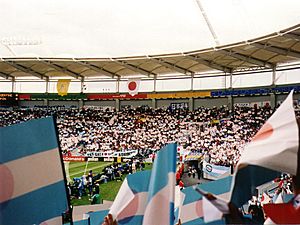
In the 1990s, the Japan Football Association worked to make its national team professional. In 1992, Japan hosted the 1992 AFC Asian Cup and won their first title. They beat Saudi Arabia 1–0 in the final.
Japan almost qualified for the 1994 FIFA World Cup. They drew with Iraq in the final qualification match, which fans remember as the "Agony of Doha". Japan's first ever World Cup appearance was in 1998. They lost all their games but impressed fans because all three losses were by only one goal.
New Millennium: 2000s
In the 2000 AFC Asian Cup, Japan won their second title by beating Saudi Arabia in the final. Two years later, Japan co-hosted the 2002 FIFA World Cup with South Korea.

They drew with Belgium 2–2, then won against Russia 1–0 and Tunisia 2–0. This helped them reach the second round. However, they lost 1–0 to Turkey in the Round of 16.
Japan won their third Asian Cup title in 2004 in China. They beat the host country 3–1 in the final. On June 8, 2005, Japan qualified for the 2006 FIFA World Cup in Germany. This was their third World Cup in a row. However, they did not make it past the group stage.
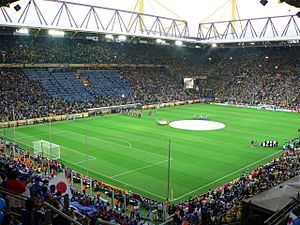
In the 2007 AFC Asian Cup, Japan did not win the title. They lost to Saudi Arabia in the semi-finals and then to South Korea in the third-place match.
Recent Years: 2010s and 2020s
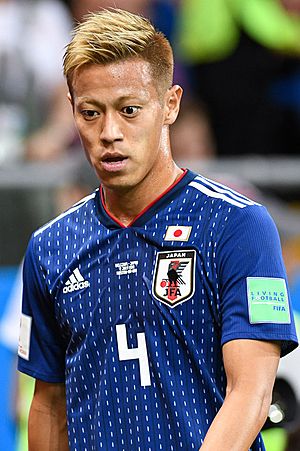
Japan was the first team to qualify for the 2010 FIFA World Cup in South Africa, besides the host. They won two group matches and reached the Round of 16. There, they lost to Paraguay in a penalty shootout after a 0–0 draw.
After the World Cup, Alberto Zaccheroni became the new coach. Japan won their fourth Asian Cup title in 2011 by beating Australia 1–0 in the final. They also qualified for the 2014 FIFA World Cup in Brazil. In the 2014 World Cup, Japan was eliminated in the group stage.
In the 2015 AFC Asian Cup, Japan reached the quarter-finals but lost to the UAE in a penalty shootout. This was their worst performance in the tournament in 19 years. Japan qualified for the 2018 FIFA World Cup in Russia. They made history by beating Colombia 2–1, which was the first time an Asian team beat a South American team in a World Cup. They reached the Round of 16 but lost to Belgium 3–2 in a thrilling match.
Japan played in the 2019 AFC Asian Cup and reached the final, but lost 3–1 to Qatar. They were also invited to the 2019 Copa América and played with a young squad, but did not make it past the group stage.
In 2022, Japan won the 2022 EAFF E-1 Football Championship for the second time. Japan qualified for the 2022 FIFA World Cup in Qatar. They surprised many by beating Germany 2–1 and Spain 2–1 in the group stage, topping their group. They reached the Round of 16 but lost to Croatia in a penalty shootout.
In the 2023 AFC Asian Cup, Japan reached the quarter-finals but lost to Iran 2–1. On March 20, 2025, Japan became the first non-host nation to qualify for the 2026 FIFA World Cup by beating Bahrain 2–0.
Team Identity
Nicknames
The Japan national football team is often called the Samurai Blue by the JFA. Sometimes, the team is also known by the last name of its coach, followed by "Japan." For example, under coach Hajime Moriyasu, the team is called "Moriyasu Japan."
Team Kits
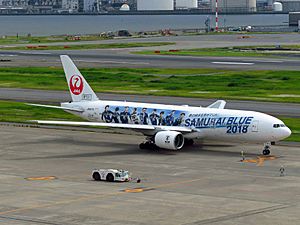
Japan's national team kit (uniform) has changed over the years. In the early 1980s, the kit was white with blue details. For the 1992 Asian Cup, the kits had white stripes and red diamonds. For the 1996 Asian Cup and 1998 World Cup, the jerseys were blue with red and white flame designs on the sleeves.
Japan uses blue and white colors instead of red and white because of a superstition. They first used blue shirts in the 1930 Far Eastern Championship Games. Between 1988 and 1992, the kits were red and white, matching Japan's national flag. But after failing to qualify for the 1990 World Cup and 1992 Summer Olympics, the red shirt was changed.
Adidas has been the team's official kit supplier since 1999. Before that, Asics and Puma supplied the kits.
Team Crest
The team's crest, or emblem, was updated in late 2017. It features the Yatagarasu, a three-legged crow from Japanese mythology. This crow is a symbol for the sun. It holds a solid red ball, like the sun on the national flag. The letters "JFA" (for Japan Football Association) are written below the crow. The shield around the crow has a gold trim and a black outline. The word "Japan" is also written on the black border.
Before 1988, Japan used the national flag on their shirts. The Yatagarasu first appeared on Japan's shirts in 1988.
Home Stadium
Japan plays its home matches at different stadiums across the country. The Saitama Stadium 2002 is one of the main stadiums where they often play FIFA World Cup qualification matches.
Team Rivalries
South Korea
Japan has a strong football rivalry with South Korea. They have played 80 times. Both countries are very successful in Asian football and co-hosted the 2002 FIFA World Cup.
Australia
Japan also has a strong rivalry with Australia. This rivalry started after Australia joined the Asian Football Confederation in 2006. They have played many competitive matches, including in the 2006 World Cup and various Asian competitions. Japan has played Australia 27 times.
Saudi Arabia
Japan and Saudi Arabia are two of Asia's most successful teams. They often meet in major tournaments like the Asian Cup and World Cup qualifiers. Both teams have made headlines for surprising wins in the 2022 FIFA World Cup. Japan has an advantage in their head-to-head record against Saudi Arabia.
Iran
Japan and Iran have a combined seven Asian Cup titles. Their rivalry grew in the 1990s when Japan beat Iran 3–2 to qualify for their first World Cup. They also met in the 2019 and 2023 Asian Cups. Japan won 3–0 in the 2019 semi-finals, but Iran got revenge with a 2–1 win in the 2023 quarter-finals.
Supporters
Japanese national team fans are known for chanting "Nippon Ole" at home matches. "Nippon" is the Japanese word for Japan.
Mascots
The team's mascots are "Karappe" and "Karara." They are two Yatagarasu (like the one on the crest) wearing the Japan national football team kit. These mascots were designed by Japanese manga artist Susumu Matsushita. Their uniforms are updated each year to match the team's new kit. For the 2014 FIFA World Cup, the Pokémon character Pikachu was also a mascot.
Recent Matches and Schedule
Win Draw Loss Fixture
2024 Matches
- September 5: Japan beat China 7–0 in a World Cup qualifier.
- September 10: Japan beat Bahrain 5–0 in a World Cup qualifier.
- October 10: Japan beat Saudi Arabia 2–0 in a World Cup qualifier.
- October 15: Japan drew with Australia 1–1 in a World Cup qualifier.
- November 15: Japan beat Indonesia 4–0 in a World Cup qualifier.
- November 19: Japan beat China 3–1 in a World Cup qualifier.
2025 Matches
- March 20: Japan beat Bahrain 2–0 in a World Cup qualifier, becoming the first non-host to qualify for the 2026 World Cup.
- March 25: Japan drew with Saudi Arabia 0–0 in a World Cup qualifier.
- June 5: Japan lost to Australia 0–1 in a World Cup qualifier.
- June 10: Japan beat Indonesia 6–0 in a World Cup qualifier.
- July 8: Japan beat Hong Kong 6–1 in the EAFF E-1 Championship.
- July 12: Japan beat China 2–0 in the EAFF E-1 Championship.
- July 15: Japan beat South Korea 1–0 in the EAFF E-1 Championship, winning the tournament.
Upcoming Matches
- September 6: Friendly match against Mexico in Oakland, USA.
- September 9: Friendly match against USA in Columbus, USA.
- October 10: Kirin Challenge Cup match against Paraguay in Suita, Japan.
- October 14: Kirin Challenge Cup match against TBD in Chōfu, Japan.
- November 14: Kirin Challenge Cup match against TBD in Toyota, Japan.
- November 18: Kirin Challenge Cup match against TBD in Tokyo, Japan.
- TBD: AFF–EAFF Champions Trophy match against Vietnam in Kuala Lumpur, Malaysia.
Team Staff
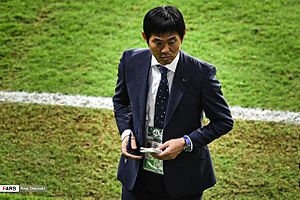
The current head coach of the Japan national football team is Hajime Moriyasu. He is supported by several assistant coaches, a goalkeeping coach, and a fitness coach.
Key Players and Records
Most Appearances
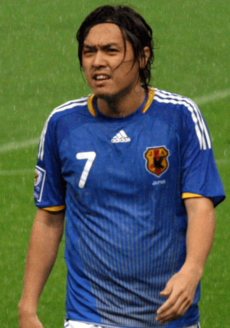
The player with the most appearances for Japan is Yasuhito Endō, who played 152 matches. Yūto Nagatomo is second with 143 appearances and is still an active player.
- Yasuhito Endō: 152 games
- Yūto Nagatomo: 143 games
- Maya Yoshida: 126 games
- Masami Ihara: 122 games
- Shinji Okazaki: 119 games
Top Goalscorers
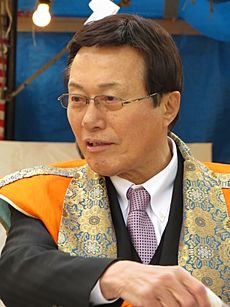
The top goalscorer for Japan is Kunishige Kamamoto, who scored 75 goals in 76 matches.
- Kunishige Kamamoto: 75 goals
- Kazuyoshi Miura: 55 goals
- Shinji Okazaki: 50 goals
- Hiromi Hara: 37 goals
- Keisuke Honda: 37 goals
- Shinji Kagawa: 31 goals
- Takumi Minamino is currently 10th with 24 goals and is still an active player.
Team Captains
The captain leads the team on the field. Some notable captains include:
- Shigeo Yaegashi (1968): Led the team to a bronze medal at the Summer Olympics.
- Tetsuji Hashiratani (1991–1995): Captain when Japan won the 1992 AFC Asian Cup.
- Ryuzo Morioka (2000–2002): Captain when Japan won the 2000 AFC Asian Cup.
- Tsuneyasu Miyamoto (2003–2006): Captain when Japan won the 2004 AFC Asian Cup.
- Makoto Hasebe (2010–2018): Captain when Japan won the 2011 AFC Asian Cup.
- Maya Yoshida (2018–2022): Captain when Japan was runners-up in the 2019 AFC Asian Cup.
- Wataru Endō (2023–present): The current captain.
Major Competitions
Japan has competed in many major football tournaments around the world and in Asia.
FIFA World Cup
Japan has qualified for the FIFA World Cup 8 times. Their best result is reaching the Round of 16 four times (2002, 2010, 2018, 2022).
- 1998 World Cup: Group stage.
- 2002 World Cup: Reached Round of 16 as co-hosts.
- 2006 World Cup: Group stage.
- 2010 World Cup: Reached Round of 16.
- 2014 World Cup: Group stage.
- 2018 World Cup: Reached Round of 16.
- 2022 World Cup: Reached Round of 16.
- 2026 World Cup: Qualified.
AFC Asian Cup
Japan has won the AFC Asian Cup a record four times, making them the most successful team in the tournament's history.
- 1992: Champions (hosted in Japan).
- 2000: Champions.
- 2004: Champions.
- 2011: Champions.
- 2019: Runners-up.
- 2023: Quarter-finals.
- 2027: Qualified.
Copa América
Japan has been invited to the Copa América, a major South American tournament, twice. They participated in 1999 and 2019, reaching the group stage both times.
FIFA Confederations Cup
Japan has played in the FIFA Confederations Cup five times. Their best performance was finishing as runners-up in 2001.
- 2001: Runners-up (co-hosted with South Korea).
- 2003: Group stage.
- 2005: Group stage.
- 2013: Group stage.
Olympic Games
Japan has participated in the Summer Olympics football tournament. Their best result was winning a bronze medal in 1968. Since 1992, the Olympic football tournament has mostly been for players under 23 years old.
- 1936 Berlin: Quarter-finals.
- 1956 Melbourne: First round.
- 1964 Tokyo: Quarter-finals (hosted in Japan).
- 1968 Mexico City: Bronze medalists.
Asian Games
Japan has also competed in the Asian Games football tournament. Their best results were winning bronze medals in 1951 and 1966. Like the Olympics, since 2002, the Asian Games football tournament has mostly been for players under 23.
EAFF E-1 Championship
This is a regional tournament for East Asian teams. Japan has won this championship three times.
- 2013: Champions.
- 2022: Champions (hosted in Japan).
- 2025: Champions.
Honours and Awards
Japan has won many titles and awards throughout its history.
Worldwide and Intercontinental Titles
- FIFA Confederations Cup: Runners-up (2001)
- Olympic Games: Bronze medal (1968)
- Afro-Asian Cup of Nations: Champions (1993, 2007)
- AFC–OFC Challenge Cup: Champions (2001)
Continental Titles
- AFC Asian Cup: Champions (1992, 2000, 2004, 2011)
- Asian Games: Bronze medal (1951, 1966)
Regional Titles
- Far Eastern Games: Gold medal (1930)
- EAFF E-1 Football Championship: Champions (2013, 2022, 2025)
Other Awards
Japan has also received several fair play awards and has been named "AFC National Team of the Year" multiple times.
See also
 In Spanish: Selección de fútbol de Japón para niños
In Spanish: Selección de fútbol de Japón para niños
 | Tommie Smith |
 | Simone Manuel |
 | Shani Davis |
 | Simone Biles |
 | Alice Coachman |


